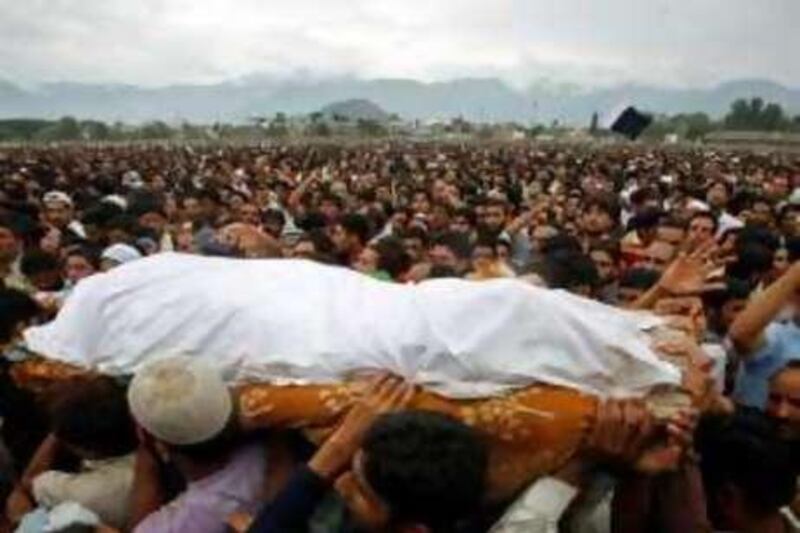NEW DELHI // Indian security forces shot dead at least 13 protesters in insurgency-ridden Jammu and Kashmir state yesterday for defying a curfew imposed following a row over the transfer of land to a Hindu organisation in the country's only Muslim-majority province. Officials said three Muslim protesters were killed near Bandipora, about 65km north of Kashmir's summer capital Srinagar, and another seven were killed in and around the city while one demonstrator was shot dead in the Jammu plains region by police and military personnel.
The shootings, in which at least 100 people were injured, came a day after the Indian military opened fire on thousands of Muslim demonstrators, killing five of them, including a top Kashmiri separatist leader, Sheikh Abdul Aziz, to prevent them from crossing the disputed frontier into Pakistan-administered Kashmir. The protesters were opposing the six-week blockade by the Jammu Hindu of the only motorway linking the Indian-administered Kashmir Valley to the rest of the country and stopping hundreds of lorries from travelling to and from the Himalayan region. They claimed the blockade had not only triggered a shortage of such essentials as medicine and food but also prevented such perishable Kashmiri fruit as apples, pears and apricots from being transported out of the fertile valley, threatening the livelihood of thousands of farmers.
The Kashmir Fruit Growers Association led Monday's march with the aim of selling their produce in Pakistan-administered Kashmir's capital, Muzaffarabad, about 25km from the disputed line of control that divides the principality between the nuclear-armed neighbours. Both sides claim Jammu and Kashmir in its entirety in a complex dispute dating to independence from British colonial rule in 1947. The rivals had also fought two of their three wars and an 11-week long border skirmish over Kashmir. The continuing turbulence, however, had exacerbated the prevailing crisis in Kashmir where several Muslim separatist groups have been waging war for independence or union with Pakistan, a conflict in which more than 65,000 people had died since 1989.
India accuses Pakistan of fuelling the Muslim insurgency, a claim that Islamabad denies, but admits it provides Kashmiri separatists political and diplomatic support. The recent upheaval was prompted by Kashmir's government reversing in July its earlier order granting 40 hectares of forest land to a Hindu pilgrimage trust, the Shri Amarnathji Shrine Board in the Kashmir Valley. The government maintained that the plot was to erect temporary huts and toilets for more than 450,000 Hindu pilgrims who annually trek to a shrine located in a precipitous and secluded mountain cave in the Himalayas. But protests by Kashmiri Muslims who feared the land grant was a calculated move by India's majority Hindu community to alter the area's demographic balance they numerically dominated led to the provincial administration cancelling its earlier order. This triggered a violent Hindu reaction that has seethed for weeks, resulting in the blockade and prompting, in turn, Kashmiri Muslims to retaliate. It also led to the resignation of Ghulam Nabi Azad, the state's chief minister, on July 7 after a coalition ally withdrew support over the land controversy. "The violence in Kashmir will escalate further as casualties in police firings fuel public fury," said Ajay Sahni, a terrorism expert at the New-Delhi based Institute for Conflict Management. He warned that in religiously charged conflicts of this kind sentiments took a while to subside, blaming the federal government of "ignoring" matters for too long. The federal government had organised an all-party conference in Jammu at the weekend to discuss the crisis, which reached no conclusion and had summoned a similar conclave yesterday that security officials said could prove equally "purposeless". "What nearly two decades of militancy could not achieve in pitting the Kashmir Valley against Jammu, the present crisis has the potential to accomplish," said Arun Sahgal, a retired brigadier and a defence analyst with the United Service Institute as well as a government consultant on Kashmir. The authorities need to finesse this matter with a lot of delicacy and deftness, but they have limited options, he said. Others were equally doubtful. "There is a sense of utter helplessness with regard to dealing with Kashmir," said Vijay Kapoor, a former lieutenant-general who has served in Kashmir. The situation can easily slip out of control, he said. In politically charged Kashmir, a senior security official, who declined to be named, said Kashmir's anti-blockade protests had "widened" to become pro-independence rallies, providing sustenance to insurgent and separatist groups that were on the decline. "Over the past three years the security situation across Kashmir had improved following peace talks with Pakistan, firm policing and a rash of economic initiatives by the provincial government," he said, adding that the government's pursuit of administrative approach to what was intrinsically a political problem would simply not work. "The security forces are no solution to such a delicate problem," he said. @Email:rbedi@thenational.ae





